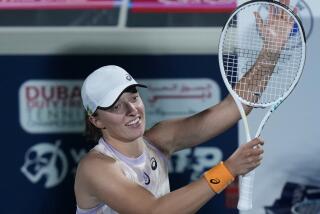He’s Moving Up in the World : Tennis: All things considered, Sampras is glad he picked up his first tournament victory in Philadelphia.
PHILADELPHIA — Two years ago, Pete Sampras, at 16 virtually unknown and altogether unranked, did the unthinkable.
He asked Marilyn Fernberger, tournament director of the Ebel U. S. Pro Indoor in Philadelphia, for a wild-card berth into the qualifying event, even though he had never played a professional tournament in his life.
Fernberger, surprisingly, granted Sampras’ request and the young man from Rancho Palos Verdes went on to win three qualifying matches before losing in the first round of the main draw to tour veteran Sammy Giammalva. The performance was good enough to allow Sampras his first computer-ranking points.
It seems only fitting, therefore, that Sampras returned to Philadelphia for another milestone, his first professional title, which he won in convincing style Sunday, beating seventh-seeded Andres Gomez of Ecuador, 7-6, 7-5, 6-2. Along the way, the 13th-seeded Sampras dispatched No. 3 Andre Agassi, who was forced to retire at one set all in their third round-match because of food poisoning, No. 5 Tim Mayotte and unseeded qualifier Mark Kratzmann in the semifinals.
“I’m very glad that my first tournament victory came here in Philadelphia,” said Sampras, who moved from No. 32 to a career-high No. 17 in the computer rankings. “It’s really very special.”
If Sampras felt special, he certainly didn’t show it. He appeared neither nervous before the final nor exuberant afterward.
His attitude, in fact, seems in direct contrast to that of his fellow teen superstars, Andre Agassi and Michael Chang, both of whom have been known to play to the crowds. Even after he was chased down by some giggly girls who presented him with roses and a kiss after his quarterfinal win, Sampras took it all in stride, saying, “I’m not worried about girls screaming at me. I’m just out there to win.”
Sampras differs from Agassi and Chang in another way, and this could prove far more important to his development. At 6 feet and 160 pounds, Sampras is a natural serve-and-volley player, although he is also not reluctant to stay on the baseline and hit scorching backhand passing shots. But his serve is his big weapon. He served nine aces in the final Sunday, the first he had ever played in.
“He is a complete player,” said Gomez, who was playing in his 31st final. “I tried really hard to find his weaknesses, but I just couldn’t. He can serve and volley or stay back, which I don’t think Chang or Agassi will ever be able to do. I definitely think he’s the best of those three guys.”
Sampras was not an aggressive player from the start, but at 14, when he realized that he probably would be tall, he gave up his two-handed backhand and started playing at the net. Within a year, he had become one of the best juniors in the country, reaching the final of the USTA national 18 tournament before losing to Chang. He avenged that loss at the U.S. Open junior tournament three weeks later.
Early on in 1988, Sampras realized that he could compete with the top players in the world. One week after his debut in Philadelphia, he reached the third round in Indian Wells, defeating established pros Eliot Teltscher and Ramesh Krishan before losing to Emilio Sanchez, then ranked among the top 20 in the world. That day, he gave up any thought of going to college and turned pro. He was ranked No. 311 in the world.
By the end of ‘88, Sampras had cracked the top 100, but one match, midway through last year, brought him to the attention of the tennis Establishment--a 5-7, 6-3, 1-6, 6-1, 6-4 second-round upset of defending champion Mats Wilander at the U.S. Open. Even after that victory, Sampras refused to celebrate, preferring instead to march calmly into the fourth round, where he lost to American Jay Berger.
It is not in Sampras’ nature, he says, to either gush or whine. He traces his laid-back attitude to his parents, father Sam, a mechanical engineer for the Air Force who never played tennis, and mother Georgia, a Greek-born homemaker who “doesn’t even know the rules of the game,” according to her son.
It is for that reason that Sampras never feels stressed out, he says.
“If I lose, big deal; if I win, that’s great too.”
More to Read
Go beyond the scoreboard
Get the latest on L.A.'s teams in the daily Sports Report newsletter.
You may occasionally receive promotional content from the Los Angeles Times.










